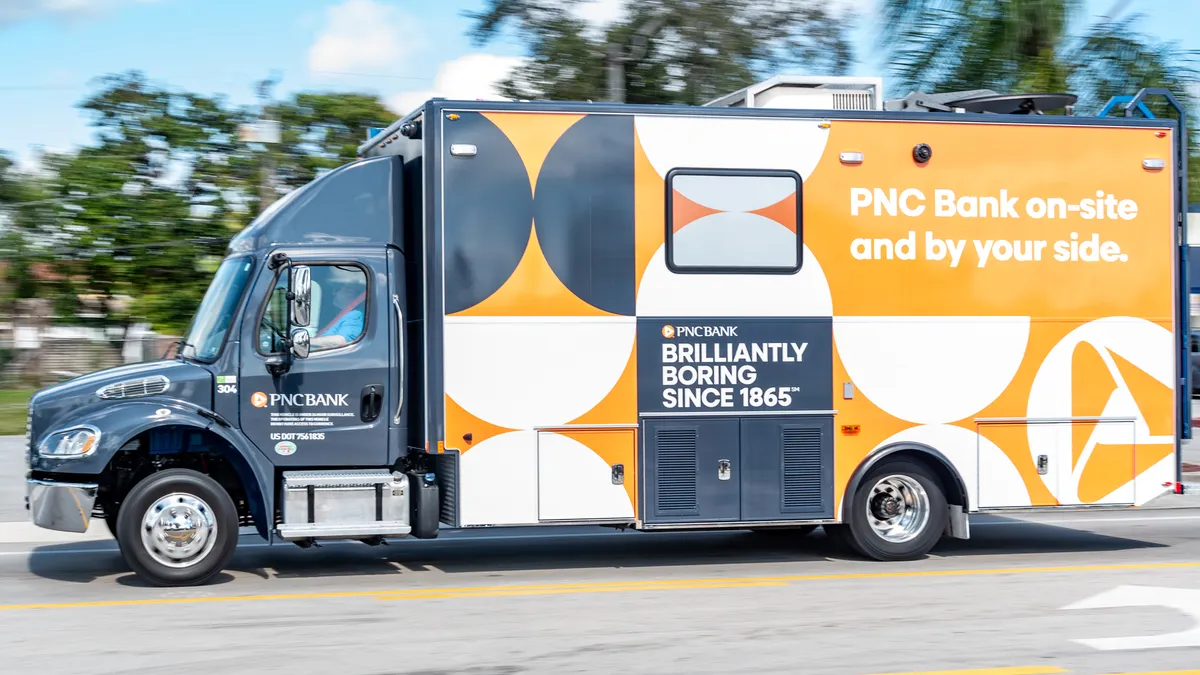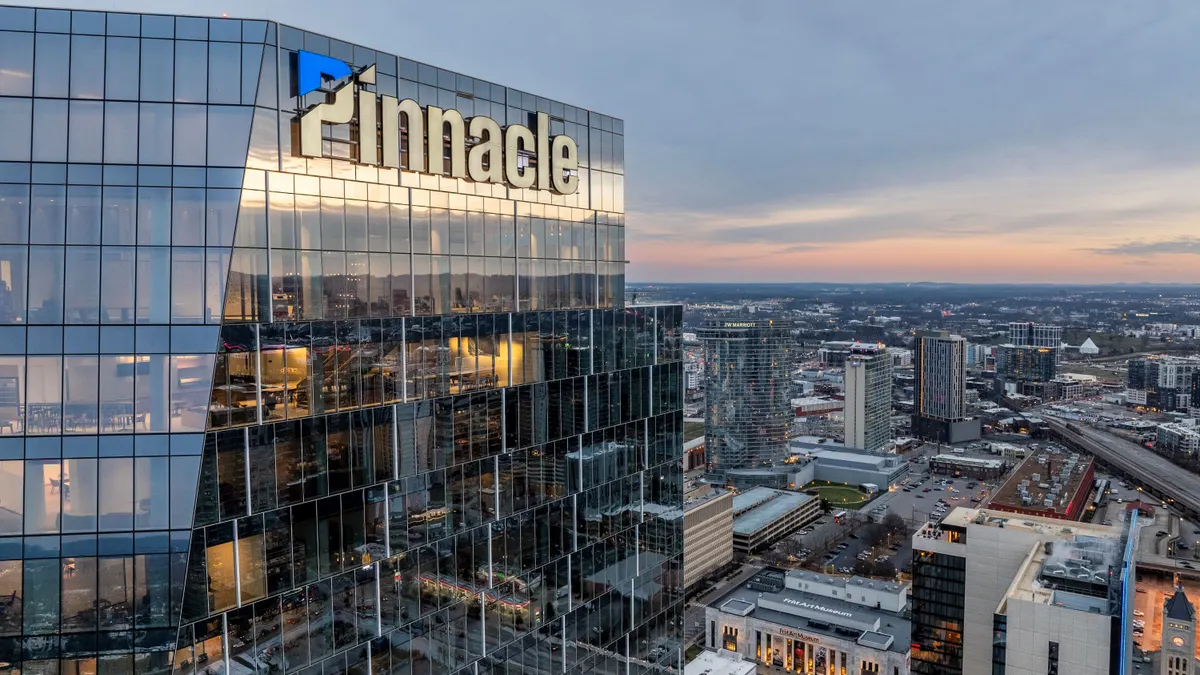Nashville, Tennessee-based Pinnacle Bank and Columbus, Georgia-based Synovus will combine in an all-stock, $8.6 billion deal that’s expected to close in the first quarter of 2026, the companies announced Thursday.
The transaction marks, by far, the largest bank combination announced since the second Trump administration has taken office – and the highest-profile example of a bank primed to cross the $100 billion-asset threshold amid expected regulatory easing.
The combined entity will operate under the Pinnacle name once the transaction closes, and the Pinnacle holding company will move its headquarters to Atlanta, the banks said Thursday.
Synovus CEO Kevin Blair will serve as president and CEO of the combined company, while Pinnacle CEO Terry Turner will be chair of the board of directors. That board will comprise 15 directors – eight from Pinnacle and seven from Synovus.
Among other anticipated C-suite moves, Pinnacle Chair Rob McCabe will become vice chair and chief banking officer of the combined company. Meanwhile, Synovus CFO Jamie Gregory will serve as CFO of the combined company.
Under the deal, Pinnacle will add Synovus’ roughly $61 billion in assets to its current $54.8 billion total, and embrace the Georgia bank’s 244-branch presence that spans five states.
“This is a strategic expansion, not a market consolidation,” Blair said on a call discussing the transaction. “The merger creates a complementary footprint that fits together like puzzle pieces.”
Market reaction, however, could be dismissed as underwhelming, as shares for Pinnacle and Synovus fell after the announcement.
Jeff Davis, managing director of financial advisory firm Mercer Capital, credited the fact that none of the U.S.’s super-regionals were involved as an acquirer.
“Wall Street loves acquisitions that entail a premium for a seller, and Wall Street will have a much more nuanced view to mergers of equals,” Davis told Bloomberg.
As it stands, Pinnacle and Synovus shares will be converted into shares of a new Pinnacle parent company at a ratio of 0.5237 Synovus shares per Pinnacle share, representing a value of $61.18 for Synovus shares, or roughly a 10% premium.
The deal, though, validates speculation that circulated this week indicating Synovus had drawn interest as a takeover target – a complication Turner noted Thursday.
“We’ve been through a long few days having to stand on the sidelines while rumors swirled and stocks traded wildly,” Turner said, according to The Atlanta Journal-Constitution.
Once the transaction closes, Pinnacle shareholders will own roughly 51.5% of the combined company, and Synovus shareholders will own the remaining 48.5%.
“We are two high-performing institutions with one powerful future,” Blair said in a statement Thursday. “Our belief in the success of this merger is grounded in a decade of strong results and proven execution from both companies. … Together with Terry and the Pinnacle team, we are primed for continued outperformance, as we are not just combining forces – we are multiplying our impact.”
‘First domino’
Critically, the deal may represent “the first domino in a new round of 'rack 'em and stack 'em,'” Michael Ashley Schulman, partner at Running Point Capital Advisors, told Reuters.
“A friendlier regulatory environment may help mint several new trillion‑dollar megabanks over the next decade, figuratively making Wall Street even more competitive,” he said.
Indeed, early in President Donald Trump’s second term, the $35.3 billion combination of Capital One and Discover had been marked as the go-to test case for what banks could expect from regulators amid a business deal.
While banks have proposed perhaps a couple dozen deals since regulators signed off on Capital One-Discover, few transactions surpassed the $1 billion threshold. Notable exceptions include Columbia Banking System’s roughly $2 billion acquisition of Pacific Premier, proposed in April, and Huntington Bank’s $1.9 billion pending purchase of Veritex, announced last week.
In the Pinnacle-Synovus deal, the banking space now has a multibillion-dollar potential template it can observe from start to finish under Trump-era regulators and supervisors.
While Biden-era holdovers such as Federal Reserve Gov. Michael Barr have warned policymakers to “resist the pressure” to deregulate, his successor as the central bank’s vice chair for supervision, Michelle Bowman, ran point this week on a conference that gauged expectations on banks’ capital framework.
Meanwhile, regulators like Federal Deposit Insurance Corp. Acting Chair Travis Hill have long bemoaned the lengthy approval timelines for proposed deals. Indeed, where a combination like Capital One-Discover took 14 months for the Fed and Office of the Comptroller of the Currency to approve, Pinnacle and Synovus are hedging their bets on an eight-month timeline.
Then there’s the hotly contested Sun Belt in which the combination will play out. Synovus had already stated its intention to hire roughly 85 relationship managers by 2027 in markets such as Atlanta; Miami, Orlando and Tampa, Florida; Birmingham, Alabama; and Charleston and Columbia, South Carolina.
Add to that the pressure cooker into which Fifth Third, PNC, Huntington, Citizens and Bank of America are vying to expand.
Turner on Thursday said he expects the deal will “extend our legacy of building share in the most attractive markets nationally.”
Executives added they are making "significant employment commitments" in Nashville, Atlanta and Columbus, Georgia. Local market leadership, meanwhile, will remain intact, Blair said.
"To me, this is so much more compelling than continuing to grow the bank organically," Blair said, according to American Banker.
The companies said they expect to realize $250 million in cost savings from the deal, which is estimated to be roughly 21% accretive to Pinnacle’s operating earnings per share in 2027. The bank expects to earn back its tangible book value per share in 2.6 years.






















